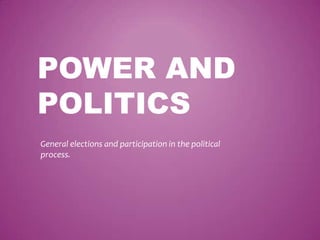
Power and Politics: Understanding Elections and Political Participation
- 1. POWER AND POLITICS General elections and participation in the political process.
- 2. LESSON AIMS • Know how general elections work • Understand the process of electing a government • Be able to identify the various ways that an individual can participate in the political process and how this has changed over time
- 4. GENERAL • Held every 5 years ELECTIONS IN • Elects the members of the House of THE UK Commons • One person one vote • Secret ballot in the constituency where we live • First past the post – 326 seats wins a majority in parliament and in the constituency a one vote majority will win the seat • Hung parliament – coalition
- 5. FIRST PAST THE POST • Disadvantages • Advantages • Many MPs will be elected by less • Each constituency elects its than half of their constituency own MP to represent them members voting for them • Usually ensures that one • Smaller political parties will be political party wins enough underrepresented – they may have a larger percentage share of seats to form a government the vote than they have seats in government – this is the principal argument for proportional representation • In the 2005 election the Liberal democrats won 22% of the vote but only 9 seats
- 6. SAFE SEATS • 2005 election • Conservative candidate for Croydon Central won by 75 votes • The Conservative candidate for Kensington and Chelsea won by 12,418 votes • The Labour candidate for Crawley won by 37 votes • Which seats are “safe” and which are “marginal”? • Define safe and marginal seat.
- 7. HOW CAN WE • Narrow view…. PARTICIPATE • Voting in elections IN POLITICS? • Standing for public office • Joining a political party • Broad view (Beetham 2002) • Being involved in trade unions • Tenants associations • Volunteering
- 16. BEETHAM • Citizenship participation can help the 2002 government be more democratic between elections • The government is made aware of the vires of the people • Citizens act as a check on and a form of control over the government
- 17. TASKS • How has political participation changed over the past 50 years? • What reasons do the Power Commission give for this? • Create a diagram to show the reasons why people may choose not to vote in general elections? • What are the characteristics of MPs? • How can we explain the low numbers of female MPs?